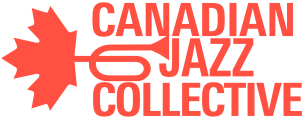You get two interviews for the price of one today, as Toronto tenor saxophone great Kirk MacDonald and clarinetist Virginia MacDonald, who happens to be Kirk’s 24-year-old daughter swing east to play Diese Onze in Montreal tonight and Festival Japan in Ottawa on Sunday.
Below, Kirk discusses his new album, Generations, a collection heavy on ballads that also features Virginia, before introducing his daughter to music fans who may not have heard her in Toronto’s jazz clubs. Then, Virginia picks up where Kirk left off, discussing why she too is on the jazz path.
Q&A WITH KIRK MACDONALD
Q: What’s prompted you to make an album of ballads and standards?
A: I’ve always thought that it would be nice to do a ballads record and have had this on the back burner for a number of years. Many leading jazz artists have recorded collections of great tunes in this format. I felt after almost three decades of primarily recording my own music that I wanted to do a recording of standards that I’ve enjoyed playing over the years. Much of my music has been influenced by many of the great jazz and Great American Songbook composers. Both are equally represented on this CD. This is music that I grew up listening to and performing for many years. In many ways this recording represents a more tangible return to my musical roots, more so than my previous recordings. This format presents significant challenges, as you really need to relate to the music on a melodic level and get inside the songs. I think of this recording as essentially a ballads CD, but have included a few medium tempo tunes which are ballads (I Wish I Knew and Emily) and one straight eighths tune (Only Child) to add variety to the CD.
Q: Why did you choose to record again with Harold Mabern, Neil Swainson and Andre White as the rhythm section?
A: I’ve done four tours in Canada with Harold in duo and with the quartet as part of those performances as well as recording the 2015 Juno-winning CD Vista Obscura with this group. There is a great chemistry and vibe to the music when we get together to play. I wanted to follow up with another recording with this group and felt this concept would work well. All the musicians are seasoned players with a deep understanding of the tradition and whom I’ve had long lasting musical relationships with.
Many people think of Harold Mabern as a heavy hitter, a hard-swinging, bluesy, soulful pianist, which of course he is. But he is also a tremendous ballads player and great accompanist who has a deep understanding of the tradition and respect for the song. Harold and I have really developed a strong musical connection over the past five years which I wanted to capture on this recording.
Q: How does it feel for you to share the stage with Virginia, and to have gone into the studio with her?
A: It is such a joy to share the stage with Virginia. As a parent, of course I’m extremely proud of her. She is a wonderful musician who has a unique voice on the clarinet that she continues to develop. Virginia possesses a deep organic feel for music and has a mature melodic approach that belies her years. She is an exceptional instrumentalist, who is one with the instrument. Her abilities on the clarinet are deceptive as she is understated and approaches the music with a great sense of spontaneity and a music first attitude.
I wanted to capture a spontaneous feeling on this CD, so there was no rehearsal and although this session was recorded at the end of a tour, many of the pieces were first played together in the studio. Virginia came in to do her tunes later in the session on the first day, playing with the group for the first time in the studio. It was great to watch her interact with four elder statesmen in such a professional and confident manner.
Q: How involved were you in Virginia’s musical education?
A: Virginia started attending the Community Music School at Humber College at around six or seven years of age starting on recorder and switching to clarinet when her fingers were big enough to cover the holes. We would spend time in the earlier years together on basic things and playing together at home but much of Virginia’s development was helped along by many of my peers. Her first teacher was Jane Fair who was a fantastic role model and was very encouraging. As Virginia progressed through the program she was involved in masterclasses and ensembles that Lorne Lofsky and I conducted along with other Toronto-area musicians such as Jim Vivian, Luis Deniz and a number of others.
Later in high school she went on to be involved in the Youth Jazz Canada summer workshops and The National Youth Combo of which I am the artistic director. In the workshop she studied and performed with Toronto faculty such as Neil Swainson, Pat LaBarbera, Brian Dickinson, Nancy Walker, Barry Romberg and visiting artists Dick Oatts, Harold Mabern, Adam Nussbaum, Rich Perry, Seamus Blake and Ben Monder and others.
Virginia is finishing up her degree at Humber College this year and has studied with Pat LaBarbera over the past few years. She attended a special five-week summer workshop this year at Berklee College on full scholarship. It was a program created for young women jazz musicians headed by Terri Lyne Carrington.
Q: What concerns if any have you had about your daughter pursuing a career in music and specifically in jazz?
A: I suppose as a musician myself I never really had the usual concerns many parents have had about the financial instability associated with the freelance lifestyle of a professional musician. Having been heavily involved in education over three decades, I see a wonderfully supportive and inclusive community of younger musicians making their way in the world. While the landscape has changed in many ways since the time I came up, there are still many great opportunities out there for talented musicians to continue to grow and hone their craft. It is important for one to follow their passion in life and to realize and enjoy the gifts that a creative pursuit and lifestyle can offer.
Q&A WITH VIRGINIA MACDONALD
Q: You started clarinet at seven and were pursuing music seriously before you entered university. Was there ever any doubt that you would become a musician?
A: Not really! I had fleeting moments of doubt, like almost every other young adult has about their future, but I think I always knew subconsciously that this is what I would end up doing.
My experience is, of course, not the norm, in the sense that I witnessed firsthand what life entails as a jazz musician. From a young age, I was aware of the many hardships that musicians face, but I also saw the joy that music brought my dad, and the countless other jazz musicians who were present in my younger life.
I remember going to jazz shows as a young girl, surrounded by fans and other musicians in dark, hazy jazz clubs and thinking, “This is so cool!” I think that exposure to music, particularly live music, so early on in my life was integral to my love for jazz, and decision to pursue music.
I have always loved jazz. Again, my experience was atypical in that I grew up listening to John Coltrane, Charlie Parker, and of course – my father. My mother ensured that I listened to my fair share of other music — particularly, the Beatles, who I still hold close to my heart. But I wouldn’t say it was something I learned to love — it was always there. As I got older, and spent more time developing my musical and theoretical skills, I was able to develop a better understanding of jazz, which only deepened my love for the music.
As an adult, I still listen to the same Sonny Stitt, John Coltrane, and Charlie Parker recordings I loved as a teenager, but now I am even more amazed by the sheer depth and knowledge within their playing.
I can’t speak for everyone, but there is just a “feeling” to playing jazz. When you get up on the bandstand on a good night, the band is locking in, and the audience is into the music, there is really nothing better. I think part of the appeal is having freedom to express yourself through a medium that other people can take part in — whether you are expressing a feeling, state of mind, opinion, etc. Jazz can be a vehicle for many different things, and that is very freeing.
Q: How would you describe your own musical direction?
A: I aim for my musical output to be as well-informed as possible, and honest. From a young age, the importance of respecting and understanding the tradition of jazz has been instilled in me. I am of the mind that for music to be progressive, it must also have firm roots in the past. As a young musician, I really just wanted to focus on playing the jazz repertoire and emulating my idols as much as I possibly could – and I still do want to, to a certain extent. Now that I am older and a bit more informed musically, I have shifted my focus to composing and performing my own music.
Within my own music, I try to stay true to myself and what I hear. The musicians and composers I appreciate most have a strong musical voice and direction, and so while I have an infinite amount of gratitude and respect for the tradition, I want to make sure that my own music has a voice of its own. I think the duality of my love for both traditional and modern jazz has opened doors for me musically, and I am lucky enough to play a variety of different musical styles for this reason.
Q: Who are some of your musical heroes and why?
A: The list is endless! To name a few of my biggest heroes and inspirations — Charlie Parker, John Coltrane, Sonny Stitt, Jimmy Giuffre, Tom Harrell, Carla Bley, Dick Oatts, Clifford Brown, and Melissa Aldana. In particular, the music of Jimmy Giuffre and Carla Bley has been instrumental to my own compositional style. And of course — my dad. Without him, I would not be the musician I am today. His undying passion and dedication to the music provides endless inspiration for me, and he is a constant source of musical knowledge.
Q: What has it been like to share the stage with your father, and to go in the studio and record with him?
A: It’s great – and it feels totally natural. It is one thing to play with a person you have a musical connection with, but when there is also a deep emotional connection and understanding between musicians, I think it just serves to elevate the music. Playing with someone as dedicated and inspired as my dad pPlaying with someone as dedicated and inspired as my dad pushes me musically, and also reminds me how grateful I am to have him.
The Kirk MacDonald quintet with Virginia MacDonald plays:
Saturday, Nov. 24 at 6 p.m. at Diese Onze in Montreal. Admission: $12
Sunday, Nov. 25 at 7:30 p.m. at Festival Japan in Ottawa. Advance tickets $30 ($20 for students) at eventbrite.ca
phum@postmedia.com
twitter.com/peterhum
ottawacitizen.com/jazzblog
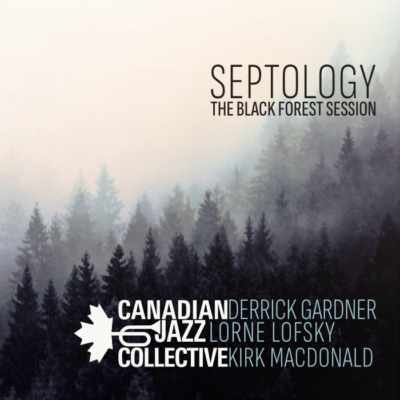 The Canadian Jazz Collective (CJC) is fronted by three of Canada’s most acclaimed and accomplished jazz treasures and familiar names to readers of these pages, especially trumpeter Derrick Gardner alongside saxophonist Kirk MacDonald, guitarist Lorne Lofsky. We introduced clarinetist Virginia MacDonald (Kirk’s daughter) on Michael Dease’s recently issued The Other Shoe. The rhythm section feature pianist Brian Dickinson, bassist Neil Swainson whose Fire in the West was one of our 2022 Top 30 Jazz Albums) and drummer Bernd Reiter. This innovative septet delivers a set of originals, three each composed by Gardner and Lofsky with Kirk MacDonald contributing two.
The Canadian Jazz Collective (CJC) is fronted by three of Canada’s most acclaimed and accomplished jazz treasures and familiar names to readers of these pages, especially trumpeter Derrick Gardner alongside saxophonist Kirk MacDonald, guitarist Lorne Lofsky. We introduced clarinetist Virginia MacDonald (Kirk’s daughter) on Michael Dease’s recently issued The Other Shoe. The rhythm section feature pianist Brian Dickinson, bassist Neil Swainson whose Fire in the West was one of our 2022 Top 30 Jazz Albums) and drummer Bernd Reiter. This innovative septet delivers a set of originals, three each composed by Gardner and Lofsky with Kirk MacDonald contributing two.
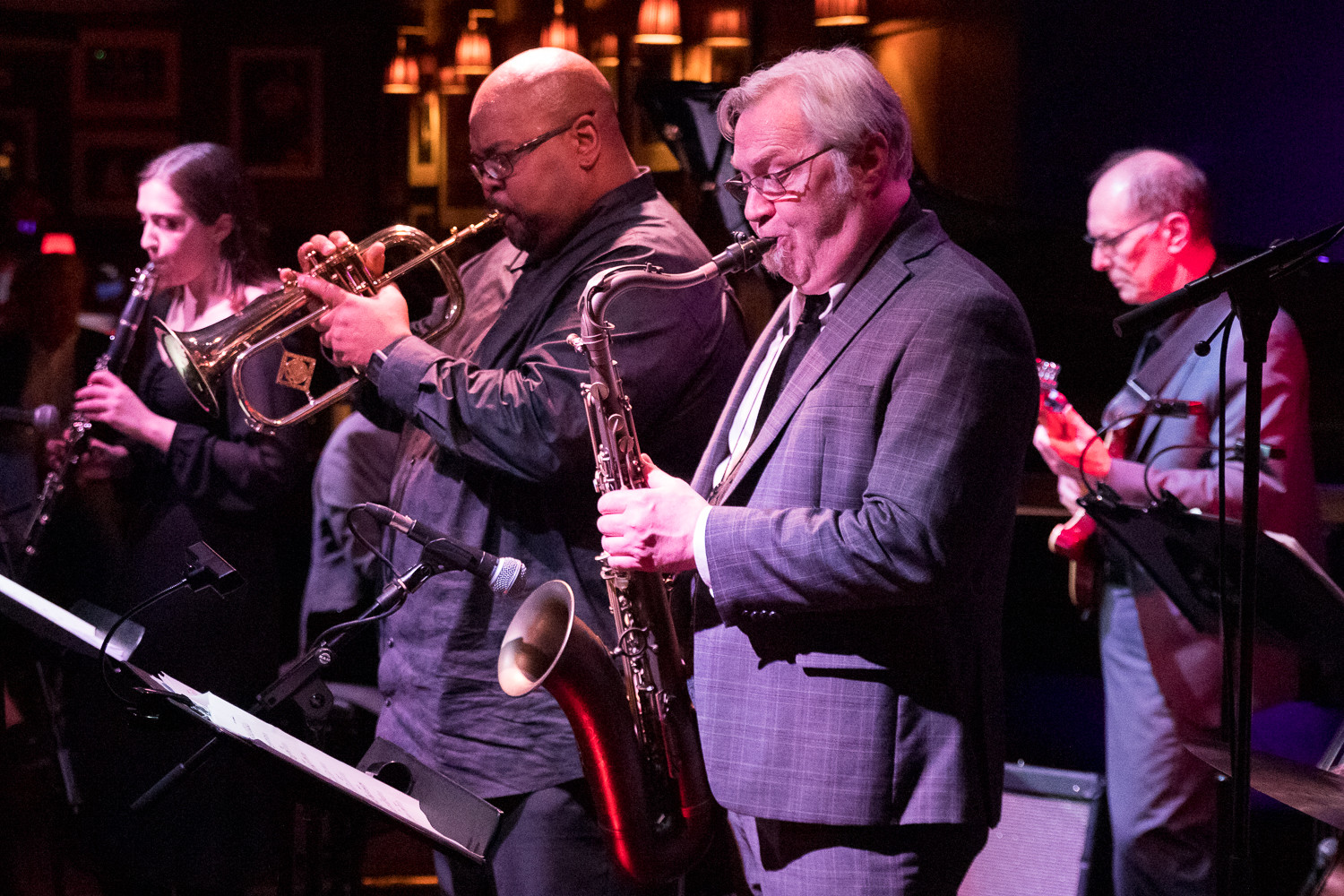
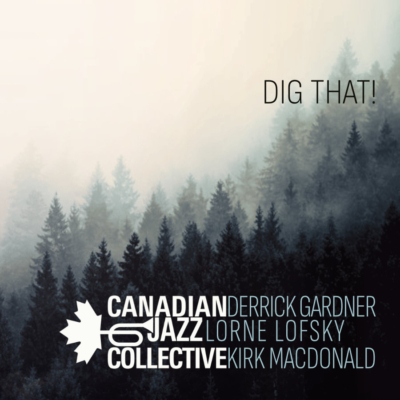 Official single release by The Canadian Jazz Collective (CJC) performing Dig That! Composed By Derrick Gardner.
Official single release by The Canadian Jazz Collective (CJC) performing Dig That! Composed By Derrick Gardner. Trane of Thought on
Trane of Thought on 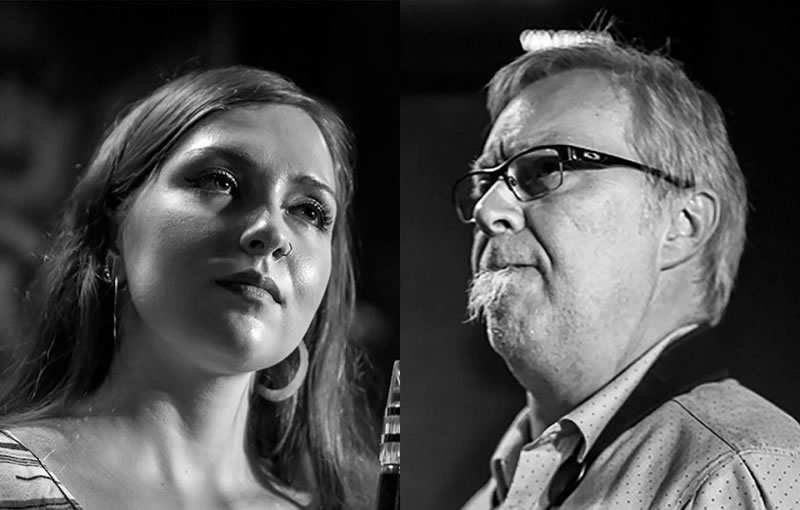
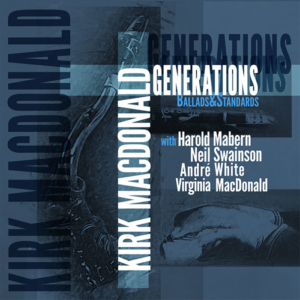 Kirk MacDonald presents his latest CD
Kirk MacDonald presents his latest CD 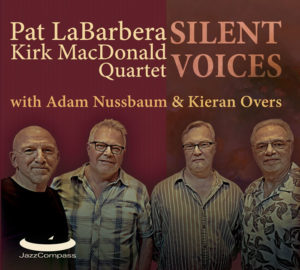 This new collective quartet puts a unique spin on the “two-horn” sound. Performing originals from each of the band members as well as the jazz standard repertoire, the Pat LaBarbera Kirk MacDonald Quartet recently toured Canada & recorded the CD
This new collective quartet puts a unique spin on the “two-horn” sound. Performing originals from each of the band members as well as the jazz standard repertoire, the Pat LaBarbera Kirk MacDonald Quartet recently toured Canada & recorded the CD  It is always a major undertaking to produce a recording for large ensemble
It is always a major undertaking to produce a recording for large ensemble 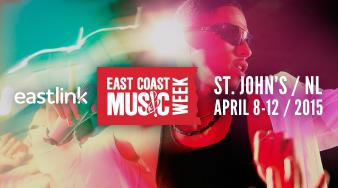 Kirk MacDonald’s CD,
Kirk MacDonald’s CD, 


